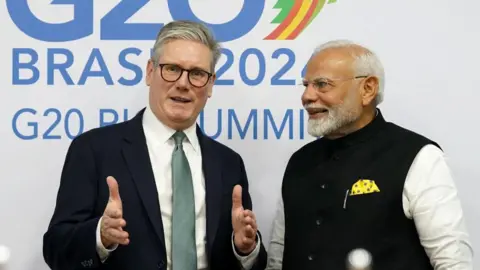Indian Prime Minister Narendra Modi is currently visiting the United Kingdom to finalize a significant free trade agreement alongside UK Prime Minister Keir Starmer. This landmark deal, touted to augment bilateral trade relations, is anticipated to bring considerable economic benefits to both nations. By reducing tariffs on various goods such as British whisky, gin, and automobiles, India aims to enhance its export potential. Conversely, the UK will increase its imports of textiles, gemstones, and a myriad of other products from India.
A crucial dialogue is set to take place between Prime Minister Modi and Prime Minister Starmer while they meet face to face in the UK. Additionally, Modi is expected to engage in a formal meeting with King Charles III, seeking to reinforce diplomatic ties and bolster bilateral cooperation between the two countries. The anticipated agreement is projected to yield a boost of £4.8 billion annually to the British economy, as confirmed by the UK government. This initiative comes nearly three years following detailed negotiations that paved the way for this trade pact.
The groundwork for the trade agreement was laid out earlier this year, with negotiations successfully concluding in May 2025. Expectations are that this pact will contribute £25.5 billion extra to the economic landscape by the year 2040. In the previous year, trade numbers between the UK and India reached approximately £42.6 billion, indicating a robust trading relationship that the new agreement seeks to expand further.
Despite the enthusiasm surrounding the trade agreement, it may take as long as a year for it to be implemented, due to necessary approval processes involving the UK Parliament. In a noteworthy development, the Indian cabinet gave its assent to the deal earlier this week, as reported by the Indian news agency PTI. Modi had previously described the agreement as both “ambitious and mutually beneficial,” indicating a shared desire to enhance economic connectivity through this trade mechanism.
In another significant moment, PM Modi remarked that this pact would be a catalyst for trade, investment, job creation, and innovation in both economies, a sentiment he expressed on the social media platform X. His vision implies that this agreement is not merely a formal trade arrangement but a strategic move towards sustainable economic relations.
In a statement reflecting on the agreement’s benefits, Prime Minister Starmer referred to it as a “major win for Britain.” He proclaimed that it would create thousands of jobs across the UK, unlock innovative opportunities for businesses, and stimulate growth within various sectors. Furthermore, Indian manufacturers are poised to gain incremental access to the growing UK market for electric and hybrid vehicles, further diversifying the commercial landscape of the trade pact.
In addition to the expected economic ramifications, stakeholders from various sectors will be closely monitoring the effects this deal has on both countries’ labor markets and businesses. The agreement signifies a substantial shift in trade policy and international relations, especially in light of the geometric changes within the global trading system.
As Modi and Starmer prepare to formalize this groundbreaking agreement, experts are hopeful it will lay the groundwork for sustained economic collaboration. The vision of flourishing trade not only highlights the economic interdependence but also solidifies the strategic alliance between India and the UK, making the anticipated pact a pivotal chapter in their bilateral relations.
Overall, this trade deal, which blends ambition with necessity, potentially marks a new epoch in Indo-British economic relations, while setting the stage for deeper cooperation that transcends mere commercial exchange to embrace shared goals of innovation and job creation.












